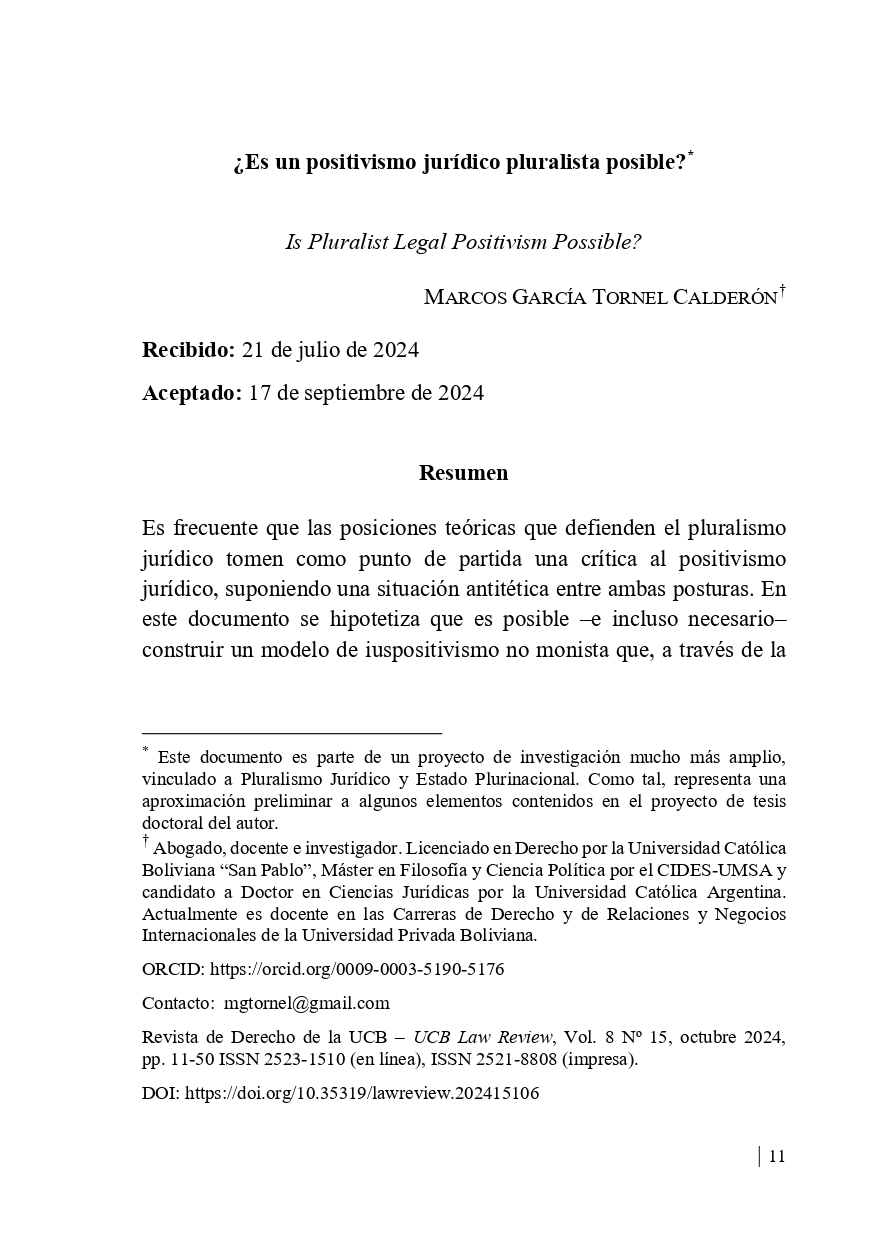Is Pluralist Legal Positivism Possible?
DOI:
https://doi.org/10.35319/lawreview.202415106Keywords:
legal positivism, legal pluralism, legal sistemAbstract
It is common for theoretical positions defending legal pluralism to start with a critique of legal positivism, assuming an antithetical situation between the two stances. This paper hypothesizes that it is possible – and even necessary– to construct, through indigenous autonomy and jurisdiction, a model of non-monist legal positivism that reconciles the traditional definition of legal order with a context of constitutional recognition of forms of legality that don’t have its origin in the State. It proposes to start from the notion that there are diverse aspects of legal positivism and test the theories of three representative theoretical positions of legal positivism –Kelsen, Hart and Raz– to identify if centralism (an element usually considered determining in the predominant forms of legal positivism) is really essential for it. Finally, some basic considerations that a positivist and pluralist approach to law should have are proposed as a way of conceiving, studying and applying it.
Downloads
References
Bobbio, N. (2007). El problema del positivismo jurídico. Fontamara. de Sousa Santos, B. (2009). Sociología Jurídica Crítica. Trotta. Dworkin, R. (1989). Los derechos en serio. Ariel.
Fabra-Zamora, J. L. (2022) The Conceptual Problems Arising from Legal Pluralism. Canadian Journal of Law and Society, 36(1), 155-176.
Griffiths, J. (1986). What is Legal Pluralism?. The Journal of Legal Pluralism and Unofficial Law, 18(24), 1-55.
Harari, A. (2022) A Critical Study of Legal Positivism as a Legal System in a Pluralist Country. Kne Social Sciences, 7(15). 563-572.
Hart, H. L. A. (2009). El concepto de derecho. Abeledo Perrot.
Hoekema, A. (2002). Hacia un pluralismo jurídico formal de tipo igualitario. El Otro Derecho, (26/27), 63-98.
Hjorth, R. (2022). Kelsen’s Legal Logic of International Pluralism. Austrian Journal of Political Science, 51(3), 62-71.
Kelsen, H. (2012). Teoría pura del derecho. Eudeba.
Mac Amhaigh, C. (2020). Does Legal Theory have a Pluralism Problem?. En B. Schiff. (Ed.), The Oxford Handbook of Legal Pluralism. (pp. 266-298). Oxford University Press.
Malinowsky, B. (1985). Crimen y costumbre en la sociedad salvaje. Planeta de Agostini.
Merry, S. E. (2008). Pluralismo jurídico. En Pluralismo jurídico (pp. 87 – 142). Pontificia Universidad Javeriana.
Raz, J. (1986). El concepto de sistema jurídico. UNAM.
Roberts, S. (1998). Against Legal Pluralism: Some Reflections on the Contemporary Enlargement of the Legal Domain. The Journal of Legal Pluralism and Unofficial Law, 30(42), 95 – 106.
Sánchez-Castañeda, A. (2016). Los orígenes del pluralismo jurídico. En Estudios jurídicos en homenaje a Marta Morineau (T. I, pp. 471-485). UNAM.
Serrano, O. H. (2015). Un diálogo en torno a la crisis del positivismo jurídico y el resurgir del pluralismo jurídico. Misión Jurídica, Revista de Derecho y Ciencias Sociales, (8), 171-187.
Scarpelli, U. (2021). ¿Qué es el positivismo Jurídico?. Zela.
Tamahana, B. (1993). The folly of the ‘social scientific’ concept of legal
pluralism. Journal of Law and Society, (20), 192-217. Wolkmer, A. C. (2006). Pluralismo jurídico: Fundamentos de una nueva cultura del derecho. Editorial Mad.
Constitución Política del Estado [CPE]. 7 de febrero de 2009 (Bolivia).
Constitución Política del Estado [CPE]. 20 de octubre de 2008 (Ecuador).
Convenio No 169 sobre Pueblos Indígenas y Tribales en Países Independientes, 27 de junio de 1989.
Declaración Americana sobre Derechos de los Pueblos Indígenas [DADPI], 15 de junio de 2016.
Declaración de Naciones Unidas sobre Derechos de los Pueblos Indígenas [DNUDPI], 13 de septiembre de 2007.

Downloads
Published
How to Cite
Issue
Section
License
Copyright (c) 2024 UCB Law Review

This work is licensed under a Creative Commons Attribution-NonCommercial-ShareAlike 4.0 International License.
The U.C.B. Law Review is an Open Access Journal, therefore, it is full free for access, reading, search, dowload, distribution and lawfull reuse in any medium only for non-comercial purposes, provided the original work is properly cited.








